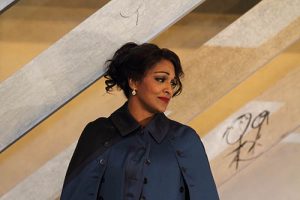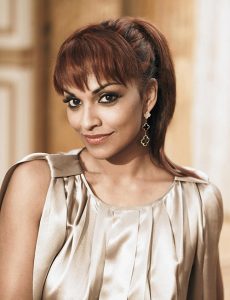


Danielle de Niese first rocked the Lyric Opera House 11 years ago as Cleopatra in an exuberant Bollywood-inspired production of Handel’s Giulio Cesare for which the Australian-born, California-raised soprano did her own spectacular dancing. Her saucy Susanna in Mozart’s The Marriage of Figaro (2010) won all hearts, and in 2014 she created the transformative role of opera diva and hostage Roxane Coss in the world premiere of Bel Canto by Jimmy López.
Surprisingly, “Danni” (as she’s called) had never portrayed Musetta until a few months ago in London, in the coproduction of La bohème that opens Lyric’s season next month. Critics hailed her role debut as an “unforgettable portrayal…[of] an individual of genuine strength” (The Stage) and “magnificent…riveting to watch, she brings complexity to the character of Musetta,…[who] is clearly on a journey in this production” (OperaToday.com).

Danni admits she’d never liked “the person this character is” in all the Bohèmes she’d ever seen — “attention-seeking, petulant, possessive, flimsy, who then turns good in the end.” She notes that with director Richard Jones there’s been an exploration of backstory for all the characters. Musetta, they decided, “is someone who looks at her assets as a woman, and thinks, ‘With what I have to give, I should have a fantastic life. I should have lovely clothes and a comfortable life.’ But she fell in love with a poor artist who can’t provide for her. Before we meet Musetta she’s extracted herself from her fiery relationship with Marcello and turned practical” by taking up with the wealthy, older Alcindoro. “I think she’s incredibly strong to make such a practical decision.” Indeed; “the boys,” as Danni calls Marcello and his broke Bohemian buddies, “are ill-equipped for life’s realities. They smoke their own fantasies and live off the fumes. Musetta is a pragmatist and that’s why she’s gone off with Alcindoro, but that doesn’t provide her certain comforts of the heart.”
Which explains Musetta’s somewhat manic state of mind when she makes her big Act Two entrance: “It’s so much more than frivolity and laughter and shopping. What’s happened to her? What’s led her to drink so much? What would really happen if you weren’t so happy in your life, and you came across an old love?” Danni relishes “finding the real person, rather than falling into the well-worn treads of archetypal characters and clichés.” Achieving naturalism in opera is challenging “because everything is so heightened and dramatically extended. It’s what we do vocally — we extend emotional thought. Richard is trying to juxtapose that with natural human behavior, and it’s hard. Puccini wrings it out of you.”
The soprano notes that because La bohème is about young people, it expresses the shared experience of performers and audiences alike: “When you’re young, everything is dead serious. Everything you feel feels so dramatic. Everything is totally, genuinely felt, and the ability to cope with situations and see them in a mature way” hasn’t yet developed. Coming to the role in midlife instead of her early 20s gives Danni the perspective to dig deeper into the character.
“Musetta is somebody you can’t ignore. She’s somebody with depth and goodness,” Danni declares. “Her understanding and humanity threads through the acts. I’ve enjoyed finding those human moments — why does she sing this? What happened before she got into this scene? What is she feeling about her life that makes her overdo it in Act Two? She’s made the right and practical decision, but she’s still not happy, and it ricochets her back to Marcello. The push-pull of relationships feels so dramatic when you’re in love. La bohème is authentic to the spirit of what love is.”
What a wonderful way to start Lyric’s 64th season — with a delightful new coproduction of Puccini’s beloved La bohème. Don’t miss the chance to fall in love with it — for the first time or all over again.

Leave a Reply